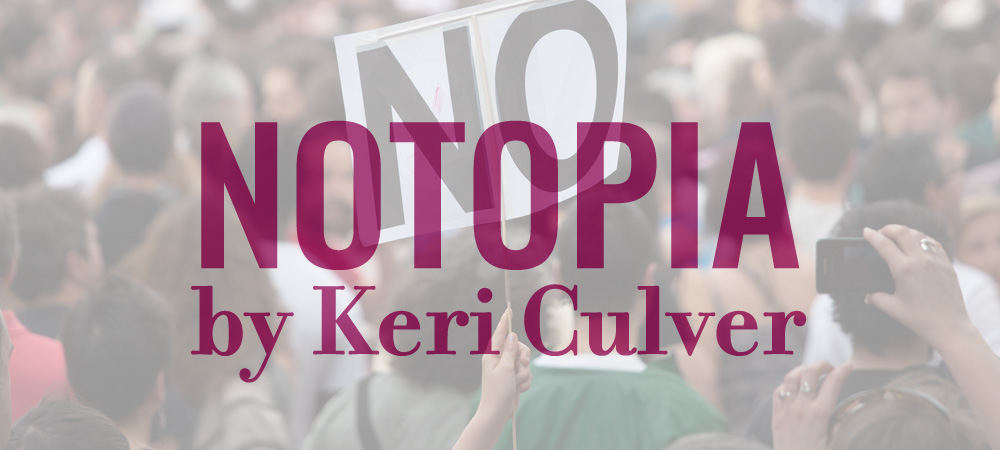by Keri Culver
Honorable Mention – Flash 405, April 2017: Trinie Dalton’s “Shangri-La”
Nonfiction

In my Shangri-La, no matters. No is confident: it isn’t just swagger. Her chin is high and one eyebrow is cocked. This no looks out for herself.
In this Notopia I have firewalls around my time, my soul, my body and my heart’s desires. The lines are transparent at first, until I say: No, I won’t take on that project. No, I won’t smile at that joke. No, I won’t quiet my “political correctness.” I’ll lose friends in Notopia, but I’m rather looking forward to it.
Straight, white, able-bodied men of means revere the word yes. As a result, yes has a fantastic reputation. An idol of mine, Spanish philosopher Fernando Savater, writes that saying yes to life is a doorway into joy. Writer Tom Robbins, who was so important to my young thoughts that I had to peel him away to find who I was underneath, used yes as a mantra. Saying yes to sex was practically holy.
Unfortunately, when straight, white, able-bodied, men of means lay claim to something, its opposite becomes the terrain of women and wusses. Saying no is a cautious and scared thing to do; it shows that one is closed to the world.
There may be a grain of truth in the critique of no. But look at all the great no going on right now. No is aflame, reclaimed from its infamy:
Black Lives Matter is no. (“No, you won’t brutalize us!”)
The Women’s March is no. (“No, you’re not our president!”)
Intersectional feminism is no. (“No, I won’t rank my identities!”)
Filling voice mails at the Capitol is no. (“No, I won’t sit back anymore!”)
Trans bathrooms are no. (“No, I won’t subvert myself to fit your definitions.”)
Protecting the environment is no. (“No, we won’t gut the earth so you can get rich.”)
Drawing lines in the sand is no. (“No, I won’t compromise choice to get your vote!”)
In Notopia, no is respected. When you say no, progress in that direction halts. No seven-layer dip, for example, is placed in front of you. No expectations are made of your time. No sex happens. No is no and that’s that.
No energizes, because it clears the path for actions you do want: the previously undermined yes. No stops something stupid from happening. No is a tool—it’s not the whole toolbox, but neither is it pseudo-psychological weakness. In Notopia, no leans in, unafraid.
Judge’s Comments:
Saying NO is the way to go! That’s the premise of this candid exploratory lyric essay in all its direct political activity. Occupying the page, phrase by phrase. NO as empowerment but yes to reflective writing.
Keri Culver is a sociologist conducting research in conflict-affected countries. She has written three novels about a sarcastic English actress who is cajoled into spying for MI6. The idea was born when her family, unable to explain what she did for a living, defaulted to “spy”; but as Keri had never successfully kept a secret outside of fiction, that talk died out pretty quickly. Keri studied writing with the University of Iowa, The Writer’s Center, and the Escuela de Escritores in Madrid. She blogs at www.WednesdayMissives.com. Favorite writers include Kate Atkinson, Ken Kesey, Tom Robbins, Alice Walker, Anne Lamott, Graham Greene, J.K. Rowling, Gabriel Garcia Marquez, Jasper Fforde, John Nichols, and Elizabeth George.